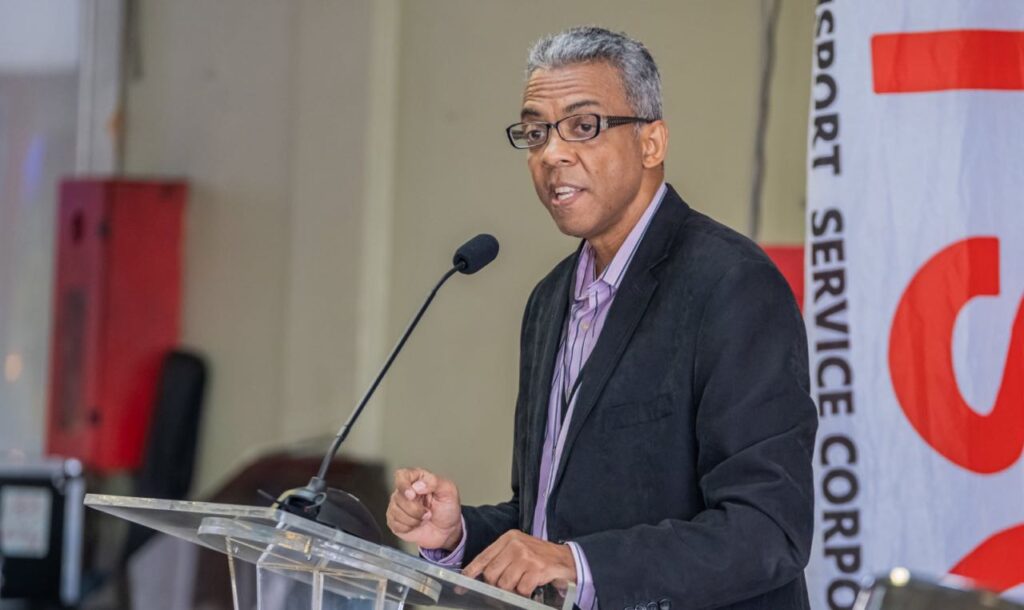
Above: Nirad Tiwarie speaks at the opening of THIS 2022. Photo courtesy AMCHAM.
BitDepth#1364 for July 25, 2022
On July 06, Amcham, the American Chamber of Commerce in TT, held the fourth edition of its Tech Hub Islands Summit (THIS).
Republic Bank executive director Derwin Howell proudly announced that the bank would support the summit as title sponsor for another three years.
Ten hours into recordings into the event, I am struck by how familiar it all is.
The local players tend not to change much.
There is a dogged corps of people pushing for action on digital transformation.
The imported players rotate, though there is a startling similarity in their messages.
They outline their experiences, chart their difficulties, explain the solutions (not all work) and urge attendees to get started.
It’s been four years since I last saw someone from Estonia explaining the advantages of a digital identity and a single encrypted ID card outlining the magic of having your personal information authenticate your presence everywhere from an emergency ward to the supermarket.

Both Public Administration Minister Allyson West and Deputy National Chief Digital Officer, National ICT Wayne Nakhid echoed those concepts of cradle to grave digital identification and the associated benefits using the ‘pregnant woman having her first baby’ trope.
Given the resonance of all the echoes reverbrating through the decades (Here’s one from 2008: https://bit.ly/3v6lyjV), Amcham’s CEO Nirad Tiwarie and president Toni Sirju-Ramnarine should seriously consider ending these talk shops that go on for days and turn THIS into a do-shop.
“We’ve been talking about this for too long,” Nakhid said.
“The same conversations I’m having now are the same conversations I was having 25 years ago.”
When the Deputy National Chief Digital Officer laments the recursiveness of digital transformation conversations, it’s time to take note.
Two speakers made me sit up from a disinterested slouch at my workstation and they were talking about quite different subjects, fete tickets and insurance.
Naresh Mongroo, Group Chief Data Officer of Guardian Holdings, offered up frank explanations of his experiences bringing technology change to the company.
Mongroo’s blunt words couldn’t have been further from his presence. Almost painfully shy, he’d look at the ground and wring his hands while telling this remarkable story.
“You can’t slap a transformation programme over your legacy system,” he said.
“You have to create a foundation.”
Mongroo acknowledged that Guardian Holdings underestimated the level of digital literacy in the organisation.
“You want drivers to lead the digital transformation,” he said, “not passengers.”
“We have employees who feel that they are part of the company now and yes, we have employees who do not feel that way.”
“We want to become a technology company, and we are creating and destroying our current organisation to create an organisational model to reflect that. If you don’t use data to drive your decisions, you won’t monetise your investment in technology and assets.”
Naresh Mongroo might not have been free to reveal all the secret sauce at Guardian Holdings, and the model of a panel discussion tends to cut short individual contributions including those of Matthew Encinas, Chief Technology Officer of Island Tickets who only flirted with the bootstrapping backstory of his business.
If THIS traded the vague promises to support the Government’s phantom digital transformation initiatives, the annual calls to proclaim digital payments legislation and the frustrated hope for more coordination between the government and private sector in favour of deeper conversations with practicing entrepreneurs like Encinas and Mongroo, it would be on a more useful track.
The state has proven over two decades that it cannot be urged, coaxed, shamed or threatened into any identifiable action on digital transformation.
There is no embarrassment when ministerial promises are regurgitated at the podium.
Yet there are hard realities in play.

Saranjit Arora, speaking during the dynamic digital intensity panel, suggested that the normal corporate spend on ICT is between three to five per cent of annual turnover on technology.
For aggressively evolving companies, those percentages hit between six to eight percent.
What’s the budget allocation for the Ministry of Digital Transformation for 2021-2022? It’s $300 million out of a budget of $52.4 billion.
Put another way, Digital Transformation Minister Hassel Bacchus was asked to implement this country’s public sector digital transformation with 0.006 per cent of the national budget.
The government has demonstrated, through its bragging about internet penetration numbers that are the result of private sector free enterprise, that it is happy to ride the coattails of change.
Time to turn THIS to tailoring.

